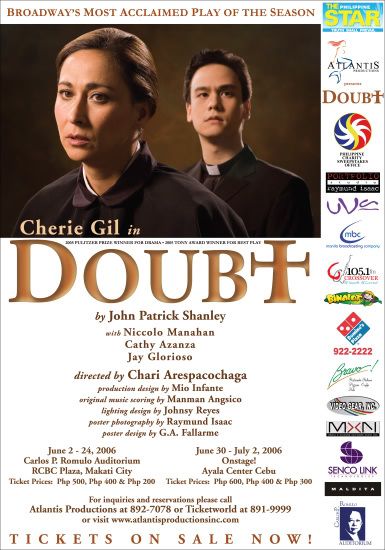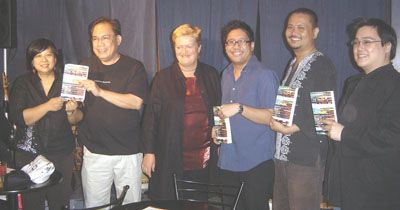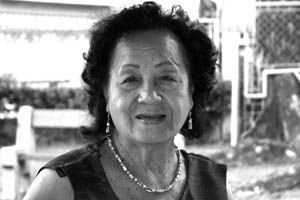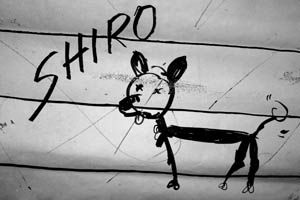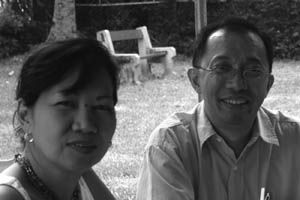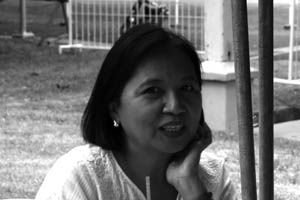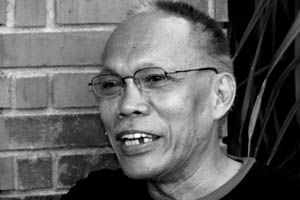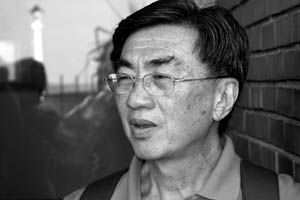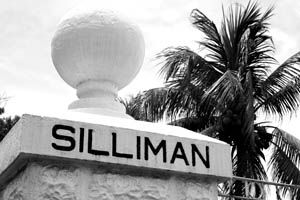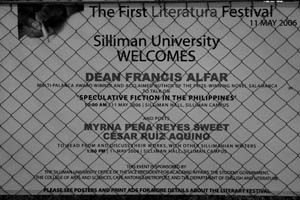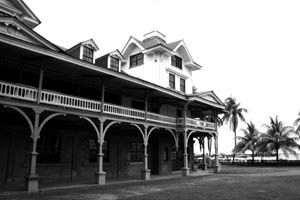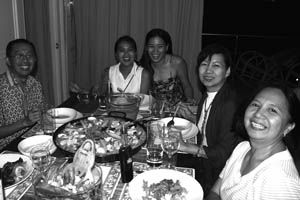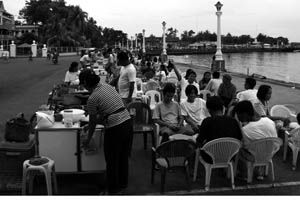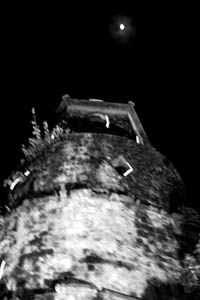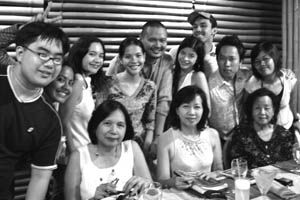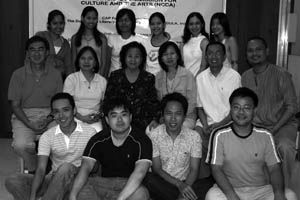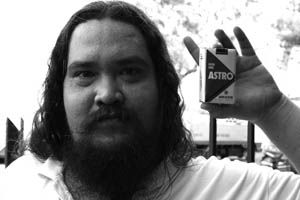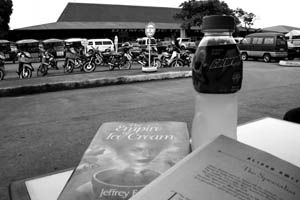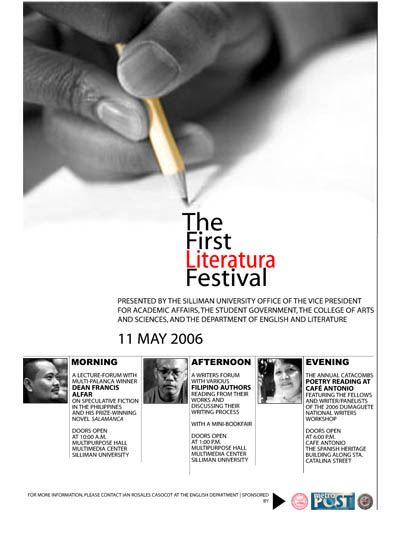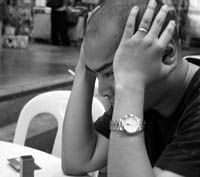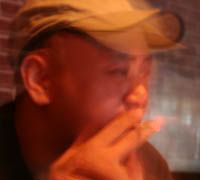TerminósBy
Dean Francis AlfarMr. Henares thinks about timeFrom the moment he opened his eyes in the morning to the instant before he fell asleep alone at night, Mr. Henares thought only about time.
He reflected about how time slowed down when he was engaged in an unpleasant activity, such as dyeing his thinning grey hair over the broken antique basin installed by his son-in-law Alvaro in his blue-tiled bathroom; and how time went faster during the rare instances when he felt happy, such as when his brace of grandchildren came for the cold weather holidays, their hypnotic music invariably loud and invigorating.
Mr. Henares recalled days when time did not move at all: waking up one morning convinced that it was the exact same day as the day before, watching the red display of his tableside clock blinking fruitlessly. The experience of the twin miércoles was to be repeated thrice more, adding jueves, viernes and sábado to his list of repeating days. He endured the repeated conversations and graceless routines, read the same stories in the newspapers and watched the same interviews on television.
Once, when he was a much younger man, Mr. Henares went back in time. The incident caught him completely unaware – he realized he was walking backwards and thinking thoughts in reverse. This unfortunate event flustered him so much that when it was suddenly over, he broke down in tears and resolved never to travel back in time if he could help it.
One morning Mr. Henares thought about the future, methodically spooning sweetsop into his mouth and spitting out the seeds into a cup. He sat at the breakfast alcove of his house that adjoined his little shop and squinted at the sun outside the windows.
“The future is always happening,” he said to the empty kitchen. “If it is always happening, then it is, in fact, the present; and any instances of the future having occurred are, in fact, the past. “
Mr. Henares stood up, wiped sweetsop juice from his chin, washed his hands, crossed the connecting corridor and went about opening his shop for the day.
Mr. Henares makes some salesHis first visitors were a trio of young men, all sporting nose rings and dressed in last year’s affectation of jeans and tulle.
“Vueño arao, Mr. Henares,” the thinnest one said, removing his Pepsi-blue hat as he entered the shop.
“Good morning,” Mr. Henares replied. “What can I do for you gentlemen?”
“We would like to sell,” the stoutest one replied, wiping beads of perspiration from his forehead with a swipe of a ruffled sleeve. “We’ve been waiting for you to open.”
“Ah,” the old merchant said, “And what do you have for me?”
“We have time to kill,” the tallest one told him, offering his hands, palms up. He looked at Mr. Henares with half-lidded eyes.
Mr. Henares shook his head. “You understand, of course, that rates have really gone down. With the new teatros and entretenimientos, people are finding things to occupy themselves with.”
“Certainly, Mr. Henares,” the stoutest one replied. “We will take what you will offer. You are the fairest merchant in all of Ciudad Manila.”
Mr. Henares brought out his tools, brass and glass and wood, and extracted the precise amount of time each young man wanted to sell. They waited patiently as he labeled each vial, heads tilted to the mellow bossa nova tracks that emanated from a pair of speakers from behind the counter. When he had finished putting everything away, he gave them their payment, wrapped in blue encaje.
The three young men opened the package then and there, much to the discomfort of Mr. Henares. The tallest one took out the Planet Hollywood shot glass and read aloud what was written around the logo, as his two companions unabashedly held hands and closed their eyes.
Silence is foolish if we are wise, and wise if we are foolishBy early evening, Mr. Henares had completed four more transactions.
A young mother, fresh from the provinces, who sold all her memories of childhood: Mr. Henares’s payment was etched on a Flores bandalore, the inscription set deep in the yo-yo’s polished wooden rim.
A drop hollows out a stoneA pair of lovers, who entered his store and left it hand-in-hand, traded in five separate occasions of romance: when they first knew they were in love, when they first kissed, when they first made love, when they first reconciled, and when they decided to stay together for as long as they could, despite all inconvenience, difficulty or portent. Mr. Henares gave them, in exchange, words written on yellowed Badtz Maru stationery, sweat and ink staining the image of the little black Japanese penguin.
Night follows dayA bored widow was next, bartering away two years of future solitude. “I’m certain someone will want that,” she said wryly, “I certainly don’t.” Mr. Henares gave her a polished citrine carved into the form of a tiny fluted flower with even smaller engraved words.
We do not care of what we have, but we cry when it is lostThe widow sniffed, “True, true,” and asked if she could purchase some romance. Mr. Henares offered her the vials he obtained from the lovers earlier. She took two and stepped out into the humidity.
The fourth customer was a proud-looking soldier, the buttons on his dress uniform shiny and golden. “My maternal grandaunt told me that I would lose my right arm in war across the sea. If it must be so, then I’d like to sell the time of actual loss and recovery.”
Mr.Henares studied the man’s resigned face and offered him, in exchange for his future pain, words woven in sawali.
An empty barrel makes the greatest soundMr. Henares prepares for bedAs he closed the shop, he reflected on how time’s ebb and flow meant different things to different people. He once had a customer, a dark-skinned young man from Cabarroquis, who protested against his good fortune in the game of love.
“Everyone I meet wants me,” the dark-eyed man sighed in Mr. Henares’ bed. “Everyone wants to devour me. I never have time for myself. I am certain that even you will soon speak to me of love.”
Mr. Henares had not really been listening to him then, but was instead enraptured by the young man’s skin, marveling at the game of hide-and-seek the candlelight and shadows played upon it. It was only much later when he remembered the words the man spoke.
As he prepared his frugal dinner of salted fish and boiled aubergine, Mr. Henares thought about how some people believed in time as a panacea for all hurt, all pain, all woes.
A pair of sisters, veiled and somber, once asked him if he had thirty years of uninterrupted time for sale. He sadly told them he did not, that no one had ever sold him a block of personal time greater than a handful of years. But inwardly, he cringed at the notion that there were people who believed in a blessed future, guaranteed happiness by imbibing his vials or selling their sorrow, whether past or yet-to-come.
He felt too old to believe in what he sold.
Before going to bed in the house that adjoined his shop, Mr. Henares checked on his trading stock, arranging various items containing words, phrases and maxims. Behind a shelf, almost hidden from his eyesight, he found a faded adarna plume etched with
Vision is the art of seeing things invisibleand a handkerchief embroidered with
What we see depends on what we look forThat night, as he stripped his clothes and slipped into bed, Mr. Henares thought about how time, whether bought or sold or unsold, robbed everyone of everything in the end. He chuckled at himself, surprised by his cynical perspective, scratched at a sore spot on his spotted arms, and went to sleep, thinking about time.
